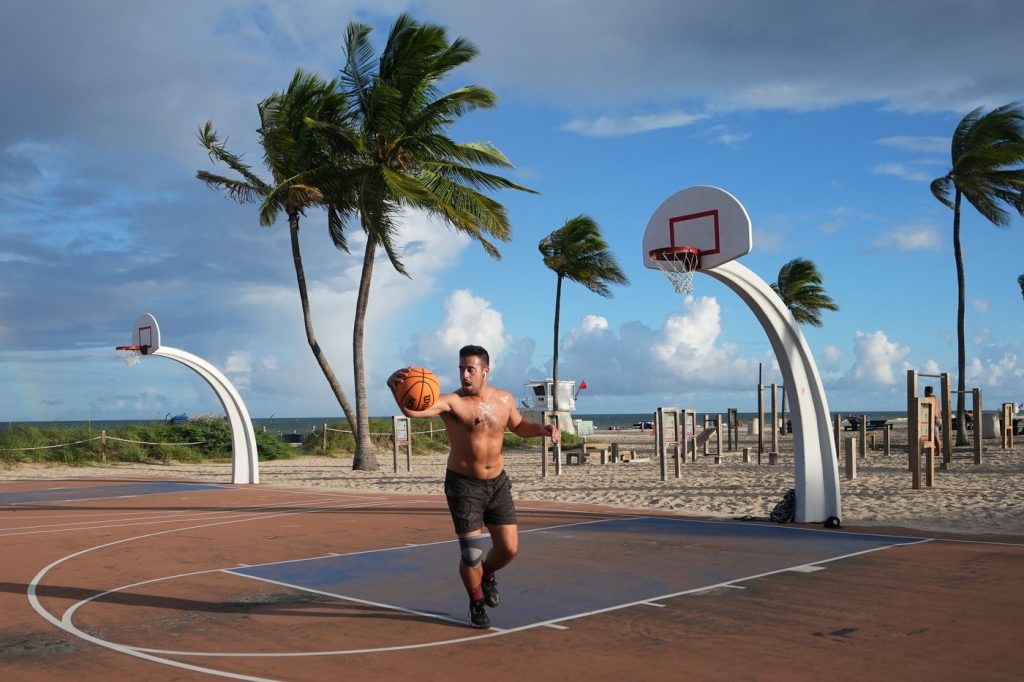FORT LAUDERDALE, Fla. (AP) — Basketball players at a South Florida park are feeling marginalized as city officials plan to replace the beachside basketball courts with pickleball courts. This shift is part of a lucrative agreement with developers for a large condo and hotel project, creating concerns among local athletes about accessibility and the future of their beloved courts.
The proposed changes to Fort Lauderdale Beach Park, where the basketball courts have stood for decades, were announced in April 2023. Ozzie McRea, who advocates for the local basketball community through a group he founded called Fort Lauderdale Beach Ballers, expressed dismay upon discovering the conversion plan. “We saw a sign put up that says that there was going to be a conversion from a basketball court to a pickleball court,” McRea said. “And that raised a lot of flags, and it was a very surreal moment, because everybody that’s seen that sign, you see their heart just dropped like out of nowhere.”
McRea and other advocates believe the changes signify an unwanted shift in demographics aimed at catering to wealthier condo residents while sidelining working-class individuals who traditionally used the courts. He emphasized the park’s value as a multicultural venue where individuals from various backgrounds gather to play basketball. “It’s a beautiful thing because we all come in harmony over here. We all play basketball,” he stated.
Moreover, some advocates have linked the basketball courts' historical significance to the Civil Rights Movement and the fight against segregation at local beaches. While historical accounts indicate an earlier presence of basketball courts in the 1960s, historians suggest that the current courts were established at least a decade after that.
In January 2024, the Fort Lauderdale city commissioners approved a $2 billion project named The St. Regis Resort & Residences Bahia Mar, which is set to include four residential towers and a hotel tower next to an existing marina on city-owned land under a 100-year lease. The developers have pledged to contribute $1 million towards improvements at the park, which they argue includes replacing “dilapidated” basketball courts with new pickleball facilities.
Maria Ilcheva, a public policy professor at Florida International University, noted that public-private partnerships like this one have become increasingly common in South Florida as urban development accelerates. While these agreements can enhance community infrastructure, Ilcheva warned that neglecting community input can be detrimental to existing residents.
Fort Lauderdale Commissioner Steve Glassman defended the city’s decision, stating that while the developers are funding park enhancements, the site will remain city property accessible to the public. He emphasized that the initiative will result in new basketball courts at another location within the park. “We’ve got the pickleball, we’ve got the basketball, we’ve got new fitness equipment, new picnic tables, new grills,” Glassman explained, insisting that they are not eliminating basketball but relocating it.
However, members of the Beach Ballers are skeptical, fearing that plans for new basketball courts may fall through after the existing ones are removed. The group is also advocating for the park to be recognized as a historically significant archaeological site, believed to have been home to a 19th-century fort during the Seminole Wars. McRea argued, “We feel that there’s no reason to move these courts. If they want to add something, wherever they think they want to relocate these basketball courts, that’s where they should relocate the pickleball courts.”
Developer Jimmy Tate stated that they would prefer to keep the basketball courts in their current location if it were feasible. However, he noted that numerous condos have already been presold based on plans showcasing the new pickleball facilities, making it challenging to alter the arrangement at this stage. Tate dismissed claims of racial or socioeconomic bias, suggesting that opposition comes from a small faction resistant to redevelopment efforts at Bahia Mar.
Tate argued that the commitment to new basketball courts proves the opposition is not solely about the courts themselves. “Here’s the irony, I played basketball my whole life,” he said. “I don’t play pickleball.”











